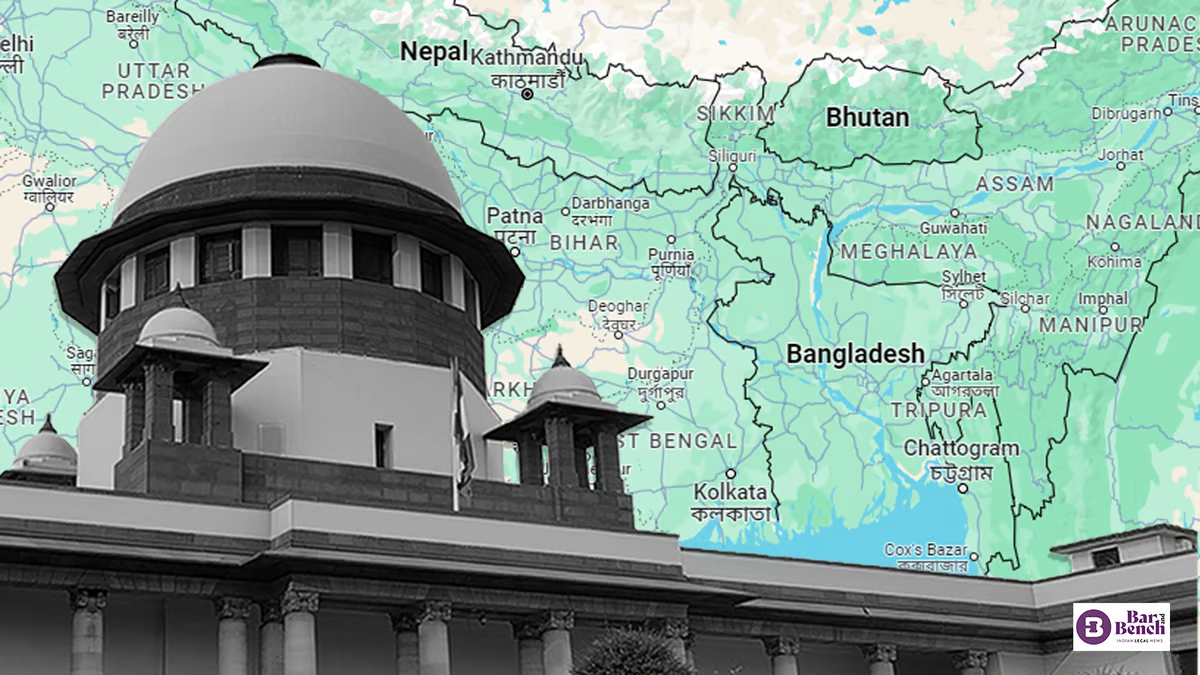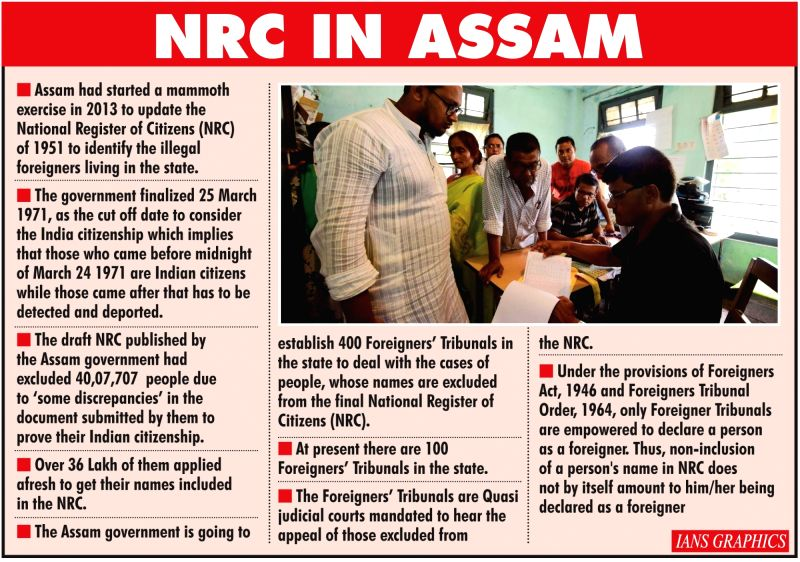FOREIGNER TRIBUNAL

Copyright infringement not intended
Picture Courtesy: https://www.barandbench.com/news/supreme-court-halts-deportation-cooch-behar-woman-declared-foreigner-tribuna
Context: The Supreme Court has halted the deportation of a woman, Maya Burman, who was declared a foreigner by a Foreigners' Tribunal in Assam.
Details
- Maya Rani Barman, belonging to the Rajbonshi community, was declared a foreigner by a Foreigners' Tribunal in Assam. This declaration was subsequently upheld by the Gauhati High Court based on her alleged failure to produce necessary documents, including her parents' old voter cards.
- She faced challenges in obtaining the required documents due to her migration to Assam following her marriage. Additionally, factors such as the death of her parents and the loss of documents in floods complicated her situation.
|
Rajbanshi Community ●The Rajbanshi, also known as Rajbongshi or Koch-Rajbongshi, are a group of people from Lower Assam, North Bengal, eastern Bihar, the Terai region of Nepal, Rangpur division of North Bangladesh, and Bhutan who have historically sought association with the Koch dynasty. ●They speak Kamatapuri and belong to the Indo-Aryan languages. They are classified as OBC in Assam and Bihar, and SC in West Bengal. |
Legal Arguments and Challenges
- Documentary Evidence: Maya Rani Barman's appeal argued that it was practically impossible for her to obtain the required documents, especially given her migration to Assam due to marriage and the subsequent loss of documents in natural calamities like floods.
- Disputed Validity of Evidence: The appeal contested the High Court's rejection of certain documents, such as her school-leaving certificate, as proof of Indian residency and citizenship.
Legal Proceedings and Supreme Court Intervention
- She challenged the High Court's decision in the Supreme Court, seeking relief from the declaration as a foreigner.
- A Bench of the Supreme Court, led by the Chief Justice of India (CJI) intervened in the matter. They directed various government bodies, including the Union and Assam governments, the Election Commission of India, and the National Register of Citizens Assam Coordinator, to respond to the petitioner's plea within three months.
|
The Supreme Court's intervention provides temporary relief to Maya Rani Barman, ensuring that she is not subjected to immediate deportation pending further legal proceedings. The case highlights the importance of judicial review in ensuring fairness and justice, particularly in cases involving sensitive matters such as citizenship and migration. |
Foreigners Tribunals
Origins and Legal Framework
- Established in 1964 through the Foreigners (Tribunals) Order. This order was issued by the Central Government under the power granted by Section 3 of the Foreigners Act, 1946.
- The Foreigners Act defines a foreigner and lays out procedures for dealing with them. The Tribunals Order sets up a quasi-judicial system to determine if someone is a foreigner based on the Act.
- While the Order applies nationwide, tribunals are currently operational only in Assam. This creates a disparity in how suspected illegal immigrants are handled across different states.
|
A 2019 amendment to the Foreigners (Tribunals) Order empowers states to set up FTs. This could potentially lead to their introduction in other parts of India, impacting how illegal immigration is handled across the nation. |
Process
- State Administration: The District Collector or Magistrate can refer cases of people suspected to be foreigners to the FTs. This could be based on intelligence reports, lack of proper documentation, or other factors raising suspicion.
- Election Commission of India (ECI): During elections, the ECI may identify voters with doubtful citizenship status (marked as "D" voters). These cases can be referred to the local Superintendent of Police (SP), who then sends them to the tribunal for verification.
- National Register of Citizens (NRC): People excluded from the final NRC list (released in August 2019) can appeal their exclusion before the FTs. This is a crucial aspect in Assam, where the NRC aims to identify genuine Indian citizens.
What Happens after Referral?
- Notice & Burden of Proof: Within 10 days of receiving a referral, the tribunal serves a notice on the person. This notice details the reasons why they are suspected to be a foreigner and clearly states that the burden of proof lies with the person to establish their Indian citizenship.
- Right to Representation: The person has the right to appear before the tribunal in person or can choose to be represented by a lawyer. This allows them to present their case and challenge the allegations.
- Evidence Presentation: The person can submit documentary evidence like birth certificates, land records, school certificates, voter IDs, or any other documents that support their citizenship claim. Witnesses can also be called to testify.
- Tribunal Hearing and Decision: The tribunal considers all evidence presented by both sides and issues a final decision.
- Declared Citizen: If the tribunal is satisfied with the evidence of citizenship, the case is closed, and the person's citizenship is recognized.
- Declared Foreigner: If the tribunal finds insufficient proof of citizenship, the person is declared a foreigner. This can have significant consequences, including potential detention and deportation proceedings.
- Detention (if citizenship not proven): If the person fails to prove citizenship and cannot arrange bail, they may be detained in a detention centre as per tribunal orders.

Challenges of tribunal Decisions
- The Supreme Court has ruled that tribunal decisions regarding a person's nationality are binding. This means they hold legal weight and cannot be easily overturned.
- Critics have raised concerns about the fairness and efficiency of FTs. These concerns include:
- Shortcomings in legal aid for those facing tribunal proceedings.
- Potential bias against people from certain communities.
- Lengthy case backlogs lead to delays in resolving citizenship status.
Way Forward for Foreigners Tribunals
- The current system of foreign tribunals in India faces challenges, particularly regarding fairness and efficiency.
Improving Fairness and Efficiency
- Legal Aid: Ensure access to qualified legal aid for those facing tribunal proceedings. This can help level the playing field and ensure proper representation.
- Training & Sensitization: Train tribunal personnel on legal procedures, citizenship verification methods, and implicit bias to minimise potential biases in decision-making.
- Fast-Track System: Implement a fast-track system for clear-cut cases to reduce backlogs and expedite citizenship determinations.
- Standardisation of Procedures: Develop standardised procedures for evidence assessment and decision-making across tribunals to ensure consistency and fairness.
Considering the National Landscape
- State-level Implementation: If states establish tribunals under the 2019 amendment, ensure proper training, resource allocation, and oversight mechanisms to prevent misuse.
- Uniformity v/s State-Specific Needs: Balance the need for uniformity across India with the potential need for state-specific adaptations based on local contexts.
Long-Term Considerations
- Review of the Foreigners Act: Conduct a comprehensive review of the Foreigners Act to ensure it aligns with human rights standards and contemporary challenges.
- Alternative Dispute Resolution: Explore alternative dispute resolution mechanisms for citizenship determination, potentially alongside FTs, to offer a less adversarial approach.
Conclusion
- Addressing the shortcomings of the current tribunal system requires a multi-pronged approach. By prioritizing fairness, efficiency, and a rights-based framework, India can move towards a more just and effective system for determining citizenship. Transparency and ongoing dialogue involving all stakeholders are crucial for achieving this goal.
Must Read Articles:
Source:
|
PRACTICE QUESTION Q. Analyze the challenges posed by India's diverse and complex border terrain, which includes mountainous regions, dense forests, and riverine areas. How can India effectively secure these borders while also considering the environmental impact and the rights of local communities living in these areas? |




1.png)
